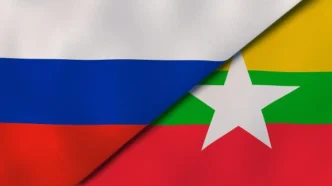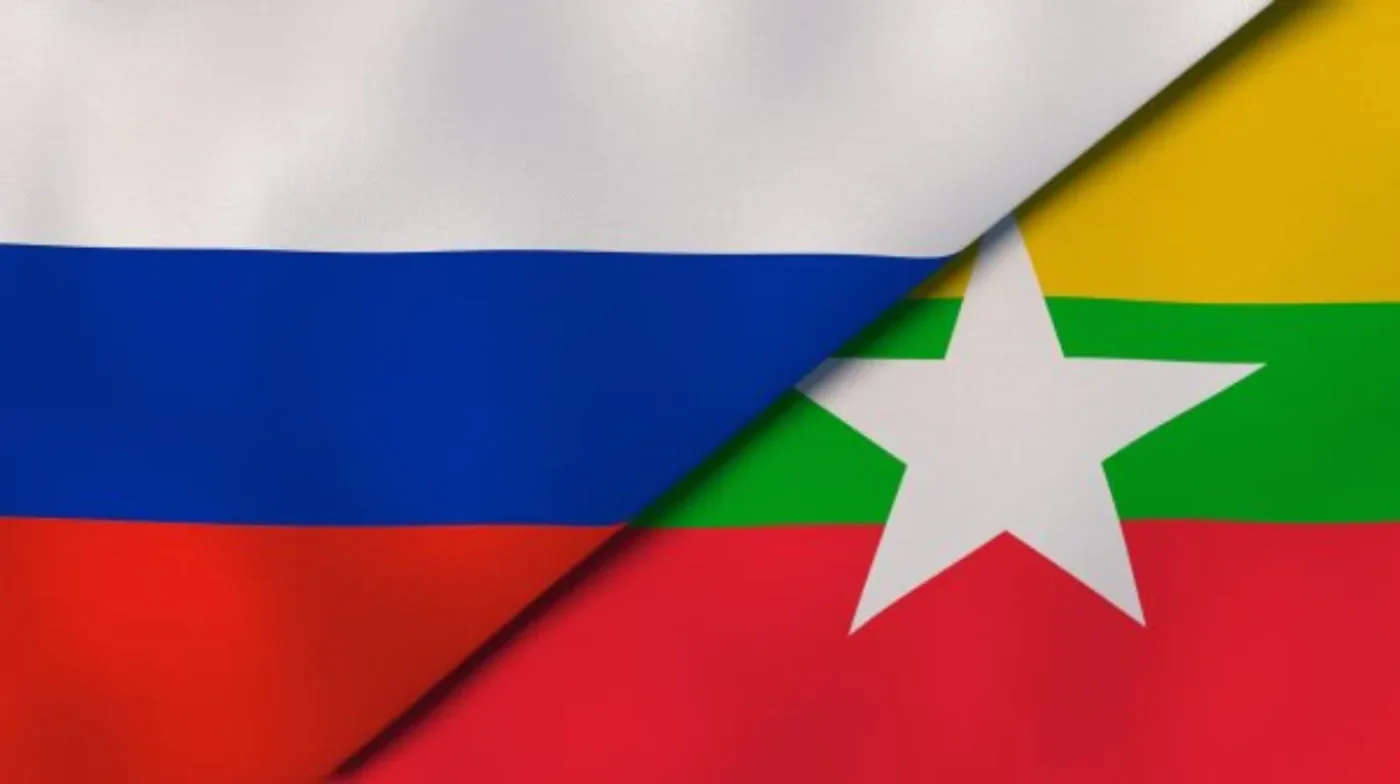A high-level Myanmar delegation, led by Senior General Min Aung Hlaing, Chairman of the State Executive Council and Prime Minister, arrived in Moscow on May 7, 2025, to attend ceremonies marking the 80th anniversary of the Victory in the Great Patriotic War of 1941-1945. The visit, at the invitation of Russian President Vladimir Putin, underscores the deepening ties between Nay Pyi Taw and Moscow at a time of significant geopolitical shifts in Southeast Asia and beyond. Beyond the commemorative events, the trip signals an opportunity for both nations to bolster strategic, economic, and security cooperation amid Myanmar’s ongoing domestic challenges and international scrutiny.
Arrival and Ceremonial Welcome
The Myanmar delegation touched down at Banukabe International Airport in Moscow at approximately 4:15 p.m. local time, greeted by Russian Deputy Foreign Affairs Minister Andrey Rudenko, alongside Myanmar’s Ambassador to Russia, U Thit Lin Ohn, and Military Attaché Brigadier General Kyaw Soe Oo. A formal welcome ceremony featured the Russian State Honor Guard, lining the aisle in a display of diplomatic respect. The delegation, which departed from Nay Pyi Taw Military Airport earlier that day on a special plane, includes key figures such as Deputy Prime Minister and Union Minister for Defence General Maung Maung Aye, Union Minister for Foreign Affairs U Than Swe, and Commander-in-Chief General Kyaw Swar Lin, alongside senior military officers and their families.
The presence of such a high-ranking entourage, including Min Aung Hlaing’s wife, Daw Kyu Kyu Hla, who is set to hold separate talks with Russian officials like Valentina Matvienko, Speaker of the Federation Council, highlights the multifaceted nature of the visit. It is not merely a ceremonial gesture but a platform for dialogue on issues ranging from bilateral trade to military collaboration.
Historical Context and Symbolic Timing
The 80th anniversary of the Victory in the Great Patriotic War—a term used in Russia to describe the Soviet Union’s role in World War II—holds profound historical and symbolic weight. The annual military parade in Moscow’s Red Square is a cornerstone of Russian national identity, commemorating the defeat of Nazi Germany in 1945. For Myanmar, participation in this event aligns with a long-standing tradition of maintaining cordial relations with Russia, a relationship that has grown more pronounced since the military coup in February 2021, which saw Min Aung Hlaing’s administration take power amid widespread international condemnation.
Russia has remained one of Myanmar’s few steadfast allies on the global stage, providing military hardware, training, and diplomatic support at the United Nations, often vetoing resolutions critical of the Myanmar junta. In return, Myanmar has supported Russia’s positions on issues like the Ukraine conflict, with Nay Pyi Taw abstaining from or voting against UN measures condemning Moscow’s actions. This mutual backing forms the backdrop of the current visit, which is expected to include discussions on further solidifying these ties.
Agenda Beyond the Parade
While the centerpiece of the delegation’s itinerary is attendance at the military parade and associated ceremonies, the visit encompasses a broader agenda. Min Aung Hlaing is slated to hold separate meetings with Russian officials and other international attendees, focusing on strengthening friendship and cooperation across economic, security, and strategic sectors. Though specific details of these discussions remain undisclosed, analysts anticipate talks on arms deals, energy partnerships, and potential Russian investment in Myanmar’s infrastructure projects.
Daw Kyu Kyu Hla’s parallel engagements with Valentina Matvienko and Anna Nesterova, Chairperson of the BRICS and Women’s Business Alliance, suggest an additional focus on cultural and economic exchanges. These meetings could pave the way for initiatives targeting women’s empowerment or business collaboration, though their outcomes remain to be seen. Such side discussions reflect an intent to broaden the scope of Myanmar-Russia relations beyond traditional military and political spheres.
Strategic Implications Amid Domestic Strife
The timing of this visit is notable not only for its historical significance but also for Myanmar’s ongoing internal conflicts. Since the 2021 coup, the country has been mired in civil unrest, with resistance forces and ethnic armed organizations challenging the military regime’s authority across multiple regions. The international community, including Western nations, has imposed sanctions on Myanmar’s leadership, isolating the junta economically and diplomatically. Against this backdrop, Russia’s role as a key supporter offers Nay Pyi Taw a critical lifeline.
Security cooperation is likely high on the agenda in Moscow. Myanmar has historically relied on Russian-made weaponry, including fighter jets, helicopters, and armored vehicles, to bolster its military capabilities. Reports from defense analysts suggest that new agreements for equipment or training could be finalized during this visit, though no official confirmation has emerged. If realized, such deals would further entrench Russia’s influence in Myanmar’s security apparatus, potentially altering the balance of power in the country’s protracted conflicts.
Economically, Myanmar stands to gain from Russian investment in sectors like oil and gas exploration, where Moscow has expertise and resources. Bilateral trade, though currently modest, could see a boost if agreements are reached on reducing tariffs or streamlining export processes for Myanmar’s agricultural products. However, any economic commitments must be viewed with caution, as Myanmar’s unstable political climate and poor infrastructure pose significant risks to foreign investors.
International Reactions and Regional Dynamics
The Myanmar delegation’s presence in Moscow has not gone unnoticed by regional and global powers. Within Southeast Asia, nations like Thailand and Vietnam, which maintain a delicate balance in their relations with both Myanmar and Western countries, may view the deepening Myanmar-Russia alliance with concern. The Association of Southeast Asian Nations (ASEAN), which has struggled to mediate Myanmar’s crisis through its Five-Point Consensus plan, faces further complications as external actors like Russia reinforce the junta’s position.
Western governments, particularly the United States and European Union, are likely to interpret the visit as a signal of defiance from Nay Pyi Taw. Sanctions on Myanmar’s military leadership, including asset freezes and travel bans, have aimed to pressure the regime into dialogue with opposition groups. Yet, with Russia’s backing, the junta may feel less compelled to engage in meaningful reforms or negotiations, potentially prolonging the country’s humanitarian crisis.
Public sentiment within Myanmar itself remains divided. While state-controlled media outlets have framed the Moscow visit as a diplomatic triumph, pro-democracy activists and resistance groups have criticized it as a distraction from domestic atrocities. Social media posts from Myanmar-based accounts reflect frustration over the junta’s focus on international pageantry while civilians face displacement, violence, and economic hardship. These voices, though often suppressed, underscore the disconnect between the regime’s priorities and the needs of the population.
Looking Ahead: A Partnership Under Scrutiny
As Min Aung Hlaing and his delegation participate in the historic commemorations in Moscow, the broader implications of their visit will unfold in the weeks and months ahead. The strengthening of Myanmar-Russia ties, while strategically advantageous for both parties, raises questions about the long-term sustainability of such a partnership. For Myanmar, reliance on a single major ally risks further isolation from the global community, potentially limiting its diplomatic maneuverability. For Russia, deepening involvement in Myanmar’s affairs could draw criticism from other international actors, even as it seeks to expand its influence in Asia.
Moreover, the outcomes of this visit—whether in the form of new agreements, joint initiatives, or symbolic gestures—will be closely watched by Myanmar’s citizens and the international community alike. Will these engagements translate into tangible benefits for Myanmar’s economy or security, or will they merely reinforce the status quo of military dominance? As the delegation returns to Nay Pyi Taw, the answers to these questions may shape the trajectory of Myanmar’s future on both domestic and global fronts.
For now, the streets of Yangon and the halls of Moscow bear witness to a relationship forged in shared interests and mutual support. Whether this alliance can withstand the pressures of Myanmar’s internal strife and external scrutiny remains an open question, one that will linger long after the parade drums fade.















